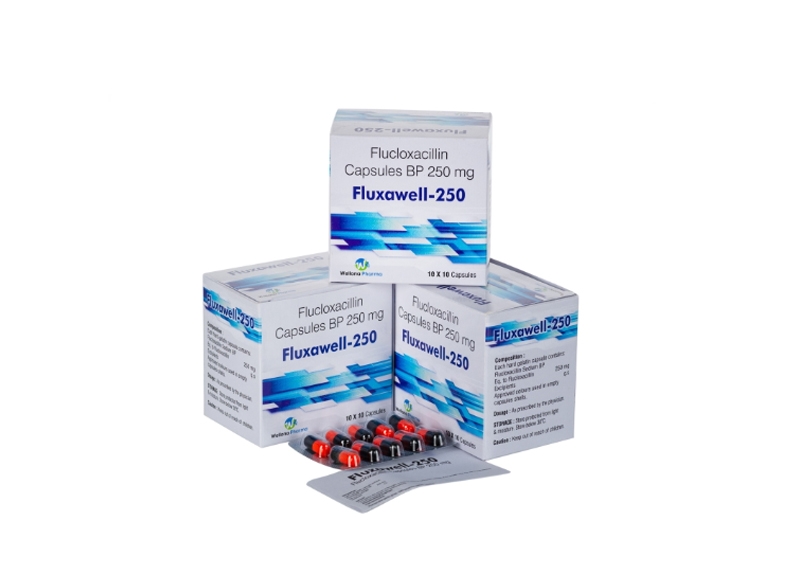Flucloxacillin is an effective antibiotic used to treat infected insect bites primarily because it targets Gram-positive bacteria, especially Staphylococcus aureus, which are often responsible for such infections. By administering Flucloxacillin, healthcare providers can prevent complications like cellulitis, abscess formation, and systemic infections that may arise from untreated bites.
This antibiotic is crucial in treating secondary infections that can occur when bites are scratched or irritated. By controlling bacterial growth, Flucloxacillin supports the body’s immune response, aiding in the resolution of the infection and reducing inflammation in the affected area.
Flucloxacillin is particularly indicated for use in infected bites that display signs of inflammation, pus, or worsening symptoms. It is also recommended for patients at higher risk of complications, such as those with diabetes or compromised immune systems. Overall, Flucloxacillin plays a vital role in managing infected insect bites, ensuring effective treatment and reducing the risk of serious complications.
Flucloxacillin is a semi-synthetic penicillin antibiotic that is effective against a range of Gram-positive bacteria, particularly Staphylococcus aureus. It is commonly used to treat skin infections, respiratory infections, and soft tissue infections. Flucloxacillin works by inhibiting bacterial cell wall synthesis, leading to the lysis and death of susceptible bacteria. It is particularly effective against penicillinase-producing strains of bacteria.
Flucloxacillin is indicated for:
- Skin and soft tissue infections (e.g., cellulitis, impetigo)
- Bone and joint infections (e.g., osteomyelitis)
- Respiratory tract infections
- Infections in immunocompromised patients
The usual dose of flucloxacillin is 250mg to 500mg, taken 4 times a day. For children, the dose may be lower.
Try to space your doses evenly throughout the day. For example, first thing in the morning (before breakfast), at around midday (before lunch), late in the afternoon (before tea) and at bedtime.
Swallow flucloxacillin capsules whole with a drink of water. Do not chew or break them. It's best to take flucloxacillin on an empty stomach. That means taking it at least 30 to 60 minutes before a meal or snack, and at least 2 hours after.
If you forget to take a dose, take it as soon as you remember, unless it's nearly time for your next dose. If this happens, just leave out the missed dose and take your next dose at the usual time. Never take 2 doses at the same time. Never take an extra dose to make up for a forgotten one.
Try to take the right number of doses each day, leaving at least 3 hours between doses. Taking an extra dose of flucloxacillin is unlikely to harm you or your child. Talk to your pharmacist or doctor if you're worried or if you take more than 1 extra dose.
Medicines and their possible side effects can affect individual people in different ways. The following are some of the side effects that are known to be associated with this medicine. Just because a side effect is stated here, it does not mean that all people using this medicine will experience that or any side effect.
Flucloxacillin is generally well-tolerated, but it can cause side effects in some individuals. Common and serious side effects include:
Common Side Effects
- Nausea
- Vomiting
- Diarrhea
- Abdominal pain
- Rash or skin irritation
- Headache
- Less Common Side Effects
- Allergic reactions: Includes hives, itching, and swelling.
- Liver enzyme elevation: May be detected through blood tests, often asymptomatic.
- Dizziness or fatigue
Serious Side Effects
- Severe allergic reactions (Anaphylaxis): Symptoms include difficulty breathing, swelling of the face or throat, and rapid heartbeat.
- Clostridium difficile infection: Can occur due to antibiotic disruption of gut flora, leading to severe diarrhea.
- Hematological reactions: Rare cases of blood disorders such as hemolytic anemia or thrombocytopenia.
For full information on side effects and correct use, see the patient information leaflet. If any side effects concern you, or you are experiencing any of the side effects mentioned in the patient information leaflet whilst taking this medication, please contact our clinical team or speak to your GP.
Allergic Reactions: Flucloxacillin can cause serious allergic reactions. Watch for signs like rash, itching, or difficulty breathing. If you notice any of these symptoms, seek medical help immediately.
Liver Health: If you have a history of liver problems, let your doctor know, as Flucloxacillin can affect liver function.
Antibiotic Resistance:It's important to use this medication only as prescribed. Misuse can lead to antibiotic resistance, making future infections harder to treat.
Difficile Infection: Taking Flucloxacillin for a long time may increase the risk of a specific type of diarrhea caused by Clostridium difficile. If you develop severe diarrhea, contact your doctor.
Known Allergies: Do not take Flucloxacillin if you have a known allergy to penicillin or any of its ingredients.
Severe Liver Disease: Avoid Flucloxacillin if you have severe liver problems or active liver disease.
History of Jaundice: If you have previously experienced jaundice related to penicillin use, you should not use this medication.
Get emergency medical help if you have signs of an allergic reaction to this medication. These include:
- Hives
- Dizziness
- Fast or pounding heartbeats
- Wheezing
- Difficult breathing
- Swelling of your face, lips, tongue, or throat.
It is important that you let us know which prescription, over-the-counter medicines and recreational drugs you are currently taking. You must also tell us about any other medical conditions that you currently have (or had in the past). This will help us ensure the prescribed medication is safe and appropriate for you to take.
For full information on warnings, medication interactions and contraindications, refer to the Patient Information Leaflet. Please read all packaging and the Patient Information Leaflet before taking any new medicine and inform our clinical team or your GP of medicines you are taking or intend to take.







